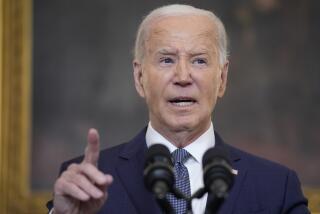Shuttling Between Hope and Despair : Syrian letter sends Baker back to Middle East
- Share via
It took Syria six weeks to respond to President Bush’s compromise proposals for a Middle East peace conference, but when its answer finally did arrive Bush welcomed it as a “breakthrough.” Enough of a breakthrough so that Secretary of State James A. Baker III will forget about accompanying Bush on his visits to Greece and Turkey later this week and will instead embark on another round of shuttle diplomacy between Israel and neighboring Arab states.
What Baker will be looking for first of all are any potential time bombs in Syria’s apparent acceptance of the Bush plan. The Syrian reply hasn’t been made public, but the time that was given over to composing it, as well as its length, suggests that each word was chosen with special care and that whatever ambiguities it contains are deliberate and consequential. Baker will want to make sure that Damascus hasn’t handed him a document whose apparent concessions are likely to collapse under close scrutiny and tough questioning. He wants to make sure that Syria’s seeming flexibility doesn’t turn out to be the old rigidity in a new guise.
Interestingly, at least some high Israeli officials are reacting as if they have reason to believe that Syria’s letter is significant. Foreign Minister David Levy and Defense Minister Moshe Arens have been cautiously welcoming. At the same time, though, Prime Minister Yitzhak Shamir’s office hastened to reaffirm last month’s quick rejection of Bush’s compromise peace proposals. A definitive response? Probably not, for Israel’s embassy in Washington soon after rushed out its own assurance that “Israel has not rejected the Administration’s proposal.” What can be inferred from all that is that (1) Syria’s response caught Israel off guard; (2) Israel doesn’t want to be seen saying no to peace talks while its enemies say yes; (3) the Israeli government, neither for the first time nor the last, speaks with many voices.
What Syria seems to have accepted are Bush’s proposals that the United States and the Soviet Union co-sponsor a conference at which the United Nations would be represented only by an observer who would see and hear but not speak. After an opening ceremonial session, Israel and the attending Arab parties--Syria, Jordan and some kind of Palestinian delegation--would begin direct bilateral talks, free from interference by the co-sponsors. From time to time the negotiating partners, if they all agreed, would be free to report their progress to the co-sponsors.
The goal of such negotiations would be to meet the terms of Security Council Resolutions 242 and 338, which basically call for Israel to exchange “territories” occupied in 1967 for peace within secure and internationally recognized borders. But the proposed interim steps would themselves be of momentous political significance, for they would require Syria and other belligerent Arab states to sit down and negotiate face-to-face with Israel, as Egypt did in 1978. Is Syria in fact ready for that? That’s what Baker hopes to find out. Revolutionary change may be riding on the answer.
More to Read
Sign up for Essential California
The most important California stories and recommendations in your inbox every morning.
You may occasionally receive promotional content from the Los Angeles Times.










